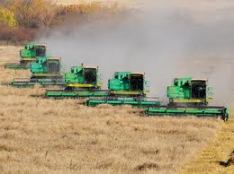From 20-22 June I was at the IAMO Forum 2012 in the Leibzig-Institute of Agricultural Development in Central and Eastern Europe (IAMO) in Halle (Saale), which was a very interesting conference analysing “land use in transition”. Joined by my colleague Dr. Oane Visser of Radboud University Nijmegen and our PhD student Ms. Natalia Mamonova, we were specially involved in the third day of the conference, in which I presented our recent work in the form of a Keynote speech, entitled “Agroholdings + Finance Capital + Land Grabbing = Global ‘Bread Basket'”?, in which we argued that the current concentration of agricultural land in Russia, amongst others through land grabbing and a growing influence of finance capital in the formation of megafarms and agroholdings, will not lead to Russia expanding very much its grain output and exports, in spite of the current very optimistic expectations of its future role in the global food market. Counter to various papers which were presented at the IAMO Forum about the potential positive contributions of agroholdings and their higher allocative and technical effciency than the much smaller individual (familiy or peasant) farm sector, we argued that agroholdings represent an unsustainable, inefficient model (at least at the production level, but not in the value chain) of agricultural production, which has environmental externalities, various social problems, high monitoring costs, and will not contribute positively to sustain a viable Russian countryside. Furthermore, it is suggested that there are around 40-50 million hectares of fertile agricultural land, of which a substantial part (mainly with coarse grains) were taken out of production in the past two decades, that can be re-cultivated, giving Russia an edge in food production. However, at the Forum 2012, Meyfroidt et al. concluded, taking into account an array of political, social and environmental constraints (such as the carbon sink represented by these lands), that only 8.7-8.9 million hectares can be re-cultivated “with minimal environmental costs”. It seems furthermore that agroholdings are more interested in cultivating sunflower, other oil-bearing crops, and silage for their expanding animal husbandry and dairy production, rather than wheat.
In the following panel Visser and Mamonova presented new work on land grabbing in Russian and Ukraine, while there were other papers on these countries which were dedicated to “politics from below”, trying to understand the (local) political economy of land grabbing in the transition context of these countries (see IAMO Forum 2012 Program). Finally, in the last conference day there was a very interesting and heated debate with (and between) a panel of experts, which included Dr. Klaus Deininger (World Bank), Dr. Alexej Lissitsa, President of the Ukrainian Agrobusiness Club, Ms. Maren Kneller of the German Ministry of Development Cooperation (BMZ), and a representative of the Russian-German Agroholding EkoNiva, under the Chairmanship of Prof. Czaba Czaki (Corvinus University, Budapest and former World Bank Advisor), in which I also participated. The most interested feature of this debate was that Mr. Lissitsa defended the position that currently Ukrainian agriculture was “efficient and sexy” for investors, while he saw the necessity to have agroholdings to become bigger than even the largest Latin American latifundia, as these were – according to him- more efficient, mainly because of their size.
Indeed, in my keynote we had already shown that large farm enterprises (LFEs) had remained dominant in the Russian farm sector, and that there seem to be a large degree of continuity in as much that before the sector was dominated by sovkozy and kolkhozy, and now by LFEs and agroholdings (integrating large numbers of LFEs) which could be seen as “Collectives 2.0” in a capitalist system (see McChestney, 2011). I furthermore argued that this “big is beautiful” and “modern means large” argument for the agro-food sector was incorrect, and that sufficient experience exist in Latin America about the inefficiency of the latifundia. Dr. Lissitsa also discarded the possible efficiency of individual farms or any form of sustainable intenfication of farming in that sector. The latter is relatively small (although it produced 20% of Russian wheat), but is in policy terms heavily discriminated, as most fiscal and other policies are developed and implemented in favour of the large agroholdings and megafarms. 
All in all a fascinating and very well organized conference at IAMO, which showed that the issue of land, land grabbing and large-scale agricultural investment is also crucial in Central and Eastern Europe, and not limited to Sub-Saharan Africa, Latin America or Asia.











